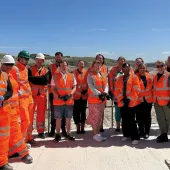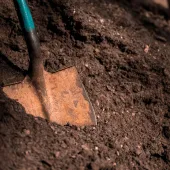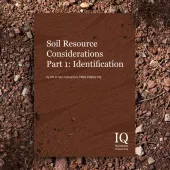Annual Conference 2005 Review

A report on the proceedings of The Institute of Quarrying’s annual conference symposium
It was the turn of the Midlands branch to host the 2005 annual conference at the Coventry Hilton Hotel from 6 to 7 October.
The Midlands branch committee took a very active part in the preparation of the conference and was congratulated on organizing a most stimulating programme for the symposium. The symposium, entitled ‘Quarrying — changing the perception’, had the objective of discussing means to improve the image of the quarrying industry held by the public. A negative image is damaging because it can create opposition to quarrying activities, especially planning applications for permissions to extend or develop quarries, and deter investment. Most importantly, at the present time, the industry has an ageing workforce and is encountering difficulties in recruiting and retaining staff, especially young persons.
By any measure the conference was a success. The planned numbers were exceeded for all of the events with 196 delegates registered at the symposium.
The proceedings began with a welcome by Gary Smith, chairman of the Midlands branch, who introduced the president, Terry Last. Terry then proceeded to award the prizes, beginning with those for the Institute’s Professional Examination.
First among the prize-winners was Lisa Marshall who won the Preston Award and was runner-up in the Clugston Award. Chido Okwuosa also won two prizes, namely runner-up in the Ransome & Rapier Award and winner of the Tilcon Award. Colin Fennelly won the Coles Award and Clive Armstrong was runner-up in the Rexnord Award. Steve Le Louarn won the Goodwin Barsby Award and Andrea Deakin was runner-up. Regrettably, Brain Bell, winner of no less than three awards, the Clugston Award, the Rexnord Award and runner-up in the Preston Award; Simon Moorhouse, winner of two awards, the Ransome & Rapier Award and runner-up in the Tilcon Award; and Hugh McGee, runner-up in the Coles Award, could not attend.
There then followed the presentations of awards for members who had presented papers to meetings of The Institute. The Marston Award for the best paper presented to a branch meeting was given to Brendan Cleaver for his paper on the propensity of employees in the quarrying industry to take risks. The objective was to investigate behavioural safety and Brendan had based his paper on a survey of delegates at a safety seminar of the West of England branch. The Ruston Bucyrus Award went to Colin Evans MBE of Penderyn Quarry for his initially unscripted address to the delegates at the 2004 annual conference. Colin had recounted his experiences and motivation to become a safety representative.
Finally, the president invited Steve Cole, chairman of the West of England branch, to accept the President’s Branch Trophy in recognition of the efforts of the branch committee to recruit new members and promote CPD. This was a remarkable achievement by the branch that has now won the trophy on four occasions and in two consecutive years, 2004 and 2005.
The symposium was arranged as two consecutive sessions chaired by Terry Last, president, and David Sharman, newly elected chairman of Council. The speakers were controlled by ‘traffic lights’ on the lectern to prevent any over-run, as experienced last year, and the entire proceedings were recorded on video tape to allow transcripts to be produced if required. In principle, the speakers in the morning gave their opinions on the industry and reasons why young, able persons were not attracted to a career in quarrying, whereas speakers in the afternoon session offered some solutions.
‘Dare to be different’ was the title of the keynote address, and the passionate, animated delivery by Dawn Gibbins MBE certainly commanded the attention of the delegates. Dawn is the founder and chairman of Flowcrete, a specialist flooring company, and the youngest business woman to receive the MBE. In 10 years Flowcrete have expanded eightfold to become the market leaders with offices in 22 countries.
By ‘different’ Dawn meant different from her perception of a dull, dusty, dirty industry run in an autocratic style by dictatorial, predominantly male, managers. She expressed her opinion that successful businesses employ satisfied staff and that ‘HR’ should stand for ‘happy relations’. In other words, happy people create a prosperous business and not the other way about. Senior managers must communicate with employees, share information and act on the findings of employee satisfaction surveys. They must be inspirational and be prepared to develop, rather than fear, talent. Indeed, it may be necessary to recruit managers who are not entirely compliant. A bright, colourful, clean and tidy workplace motivates employees and success should always be celebrated with the staff as an achievement of the team. She concluded by identifying the largely untapped resource of women as managers of manufacturing industry and recommended that HR managers should visit and use a web site ‘Where women want to work.com’, recently created by Dr Glenda Stone, CEO of Aurora.
Appropriately, Dawn’s advice to the industry was followed by a ‘double-act’ during which two graduates and former employees of the quarrying industry explained their reasons for leaving to establish their own consultancy, By Design Group. Talking on the title ‘Is the grass greener?’, Geoff Parsons, an Olympic athlete and former business development manager with Blue Circle Cement (now Lafarge), said that he was extremely competitive but saw a lack of linkage between performance and reward in the industry. Although his livelihood was now less secure and more demanding of his time, he derived immense satisfaction from building a business. Paul had worked as an assistant quarry manager and sales manager for Aggregate Industries. He said that he had enjoyed both the business and the people except during a period of extremely long working days but, again, now saw a direct link between his efforts and reward.
Interestingly, Andy Maggs, president of Vadis People Services, presented the results of his research into the perception of the industry held by graduates and the graduate market for jobs generally. He compared recruitment to dating at dances using the title ‘A job in quarrying; sexy or not?’ His first findings were that salaries offered by the industry meet the expectations of graduates but that benefits (car, relocation etc) may not. Surprisingly, graduates did not hold all of the expected negative perceptions. They perceived the industry to be dangerous and male-dominated but also interesting, technical and practical. Many, however, had no information or opinion but were, in general, looking for jobs that offered a career progression, good salary and training. Thus, it was both possible and important for the industry to create a positive image by activities such as: offering work experience and sponsorship, attending school open days and participating in graduate fairs and the ‘milk round’. He noted that the industry had no presence on important careers web sites visited by graduates. In summary, he concluded that the industry should go to different dances, become smarter at dating and show its ‘dates’ new dances.
Richard Kell, formerly the mineral planning officer for Leicestershire, asked the question ‘Can a quarry ever be a welcome neighbour?’ and examined the public perception of quarrying. In his opinion the answer is ‘no’ but it very much depends on a person’s position as a stakeholder, employee, community representative, customer or impacted neighbour. Two key issues remain to be resolved. First, the public must recognize that quarrying is a response to their demands and consumption, and second, the industry must address the fears of local residents concerning the effects of quarrying on their properties. The solution lies in better communication between quarrying companies, regulators and the local community. In this respect, the Government has recently revised the planning process to ensure that the local community has a greater opportunity to participate in the decision-making process. Communication of information by operating companies must be transparent and companies must accept responsibility for promoting the benefits of the supply of minerals. Employees also have an important role as ambassadors for the industry and providers of information. Finally, the elected representatives of the community and planning officers must explain to the public, and especially to individual members of the local community, that their job is to implement the planning process for the general good and not to represent individual self-interests.
The perception of the long working hours associated with quarrying was addressed by Alan Connolly, a quarry manager with Aggregate Industries, in a talk entitled ‘Work, rest and play — can quarry workers expect a balance?’ Alan recounted his experience of introducing an ‘annualized hours’ scheme at his quarry in order to comply with the Working Time Directive (WTD) and greatly impressed the audience with his honesty, sincerity and common sense. He concluded that implementation of the WTD would make the industry more attractive to men and to women as well as ethnic minorities who are under-represented in the industry. In the past, operators had worked 60–80h a week in an ‘overtime culture’, but now worked an average 48h week and enjoyed a better quality of life. There were, however, certain essential prerequisites. Managers must trust the operators and workers must be committed to completing tasks and satisfying customers. The management may need to invest in training to create flexible, multi-skilled operators but the benefits include greater productivity, predictable costs and, most importantly, easier recruitment.
Richard Bate of Green Balance expressed his opinions on the environmental performance of the quarrying industry against a backdrop of recent photographs of derelict and abandoned sites, pollution of water courses, poorly restored land and highly visible quarry faces. Despite great improvements and a much better understanding of methods to ameliorate the environmental impacts of quarrying the industry still faced the challenge of creating trust in the minds of the public. The industry will be judged by the worst performers, not the best, and it may be necessary to remedy some of the legacy of poorly restored sites. In his opinion, the whole industry, not just individual companies, must show empathy with the local community and recognize their legitimate fears of the unknown when proposing quarry developments. The public needs to be persuaded that the industry is responsible and delivers promises. It is not sufficient to prepare a technically acceptable proposal. He referred delegates to a website created by Debra Stein that offers practical advice on overcoming NIMBY opposition and suggested that a better environmental image would facilitate recruitment.
Immediately after lunch the stage was taken by Cedric Hollinsworth who addressed the delegates on a matter of serious concern that could also affect both recruitment and retention of quarry managers and supervisors. Speaking as chairman of the EPIC Education & Training Committee, he informed the delegates that the failure rate of employees studying the DAPS course had been increasing and had now reached unacceptably high levels. He was concerned that students were not being afforded sufficient time for study owing to the pressure of work and that they were not receiving assistance from their line managers or mentors. He encouraged HR and training managers to identify such students within their companies and ensure that adequate support was provided.
The symposium then continued with three presentations containing ideas and proposals for resolving the recruitment issue.
To the sound of ‘Help’ by the Beatles, Tony Davies introduced his presentation on the strategy of self-help being adopted by Tarmac to recruit graduate managers. The company had recognized that the job of quarry manager had become much more demanding, requiring intellectual ability, competency and knowledge of quality management, health and safety procedures and environmental protection, IT literacy, leadership and customer service. Unfortunately, this change had occurred during a period when the mining industry in the UK was declining and became regarded as a ‘sunset industry’. In a survey conducted by Tarmac, ‘construction’, including quarrying, proved to be the least attractive sector for job seekers.
Tony then explained that Tarmac were adopting the same strategy for recruitment of managers as for ensuring the supply of aggregates; investment in educational resources and broadening the appeal to women and non-traditional employees (exploration and discovery of new reserves), retraining of graduates (conversion and up-grading of products), work experience, sponsorship and schools liaison (engaging the local community), collaboration and importation. He illustrated these with examples taken from the activities of the Tarmac Group and concluded optimistically with the Beatles’ number ‘We can work it out’.
Andreas Siegmann then surprised delegates by informing them that retail supermarkets also struggle to recruit capable young managers. As a consequence, Aldi Stores had implemented a recruitment strategy that comprised three elements: marketing the employer, remuneration and opportunities.
Throughout all their activities Aldi promote a positive image as a well managed, successful company. This image is created by the quality of advertising, premises, correspondence and livery of vehicles. Candidates are always interviewed in a pleasant environment and given honest information about duties and career prospects. The success of the business is emphasized rather than the nature of the business. Aldi offer higher salaries but expect more. The company sets clear performance targets and invests in training. A clear career path is offered but promotion is given on the basis of potential not as a reward for work done.
Bill Bolsover, chief operating officer of Aggregate Industries, concluded the proceedings with a very sophisticated presentation that confirmed many of the points made earlier in the day but also showed the way forward. By means of recorded interviews with ‘people in the street’, he showed that the public had either a negative image of working conditions in the quarrying industry or no image at all. Indeed, nobody could name a quarrying company. It was Bill’s opinion, therefore, that the operating companies needed to take pride in their contribution to society and promote brand names and adopt slogans in the same way as, for example, supermarket chains.
The audience was then treated to a preview of a short advertising video prepared by the QPA that would be suitable for screening on national television. Information on employment opportunities also needed to be readily available on web sites.
The success of the symposium was matched by the social events with both dinners exceeding the planned numbers. The guests at the welcome dinner enjoyed being entertained by Dyfrig James, deputy managing director of Lafarge Aggregates, and also a former national president of the Round Tables of Great Britain and Ireland and an accomplished after-dinner speaker. Those who attended the dinner and dance complimented both the menu and the reformed band ‘City Lights’.
The outing for partners of the delegates comprised a visit to the recently redeveloped Bull Ring shopping mall including luncheon at the Arts Cafe contained within St Martin’s church.
The Institute is grateful to Metso for providing the gifts at the welcome dinner and to Volvo for sponsorship of the conference. The ladies’ gifts at the dinner and dance were purchased with money raised by the former Associates Section so the Midlands branch made a donation of equal value to charity.








